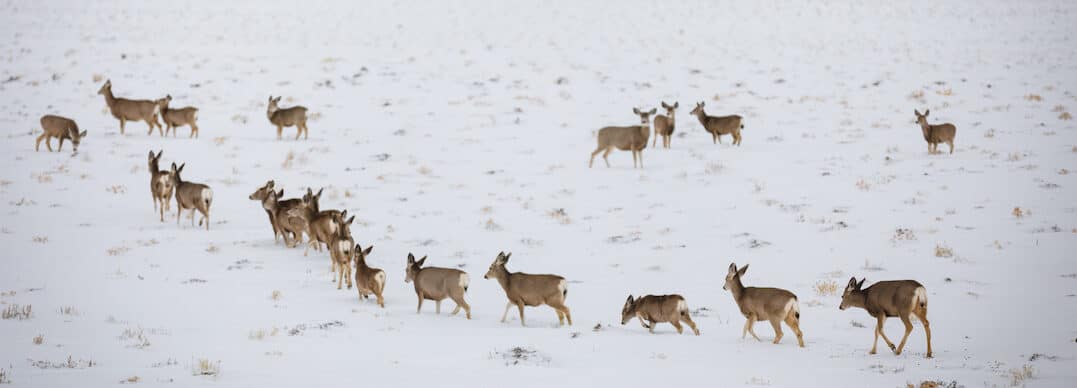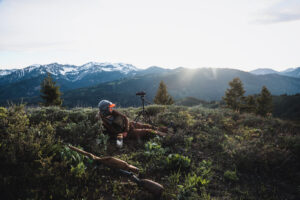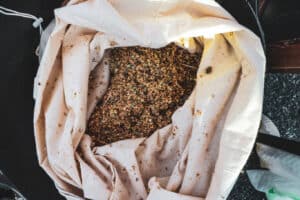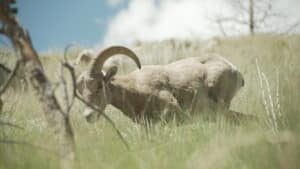ith increasing pressures on wildlife migration habitats and specifically the thoroughfares in which animals move and migrate, come an increasing need for programs and initiatives that focus on conserving these vital habitat corridors. We are committed to work that will help protect these routes and the animals that use them, while still allowing for biologically and economically sustainable development to occur.
HABITAT PROJECTS
WWF work with landowners and public land managers to complete large projects for wildlife. We are partners in the Red Desert to Hoback Fencing Project, an effort to replace or remove over 100 miles of fencing in the migrations corridor. In the past 5- years we have worked with the Sublette Conservation District to remove old fencing and replace it with wildlife-friendly fencing on over 60 miles of fence.
The Wyoming Range migratory corridor extends from the southern tip of the Greater Yellowstone Ecosystem, near La Barge, WY, to just south of Grand Teton National Park in the Snake River Range. While much of the corridor is on public lands; there are extensive areas held by private landowners. The Wyoming Wildlife Federation is uniquely suited to work with landowners, and state and federal managers, to build a long-term effort to reduce impediments to deer migrations while improving range conditions for local ag producers.
POLICY WORK
Conserving these corridors while reducing and eliminating barriers to migration through ongoing policy work ensures that we will have healthy herds for the coming years and the next generation. As an example, in early 2020, WWF helped advise and draft Governor Gordon’s Executive Order on Migration Corridors (2019-01). This EO provides a framework for designating corridors, like the Wyoming Range and Platte Valley Corridors, using local working groups to support the conservation of these areas, respects landowner rights, and allow for multi-use opportunities on public land.
WWF is working diligently on the Rock Springs Resource Management Plan and we are expecting a draft released any day now. Within the Rock Springs RMP, the Federation is focusing on 6 priority habitats, which includes the Red Desert to Hoback Migration Corridor and ensuring it stays connected with little disturbance to the habitat along the route. Additionally, WWF is in the pre-planning stages of the Bridger-Teton National Forest Management Plan, which includes the summer range for multiple migrations. Helping mold the policies managing our public lands, like the NF Management Plan and the Rock Springs RMP, is key in making sure migration corridors remain intact and are a major focus of the Federation’s staff.
LEGISLATIVE ACTION
In 2020, WWF worked to pass multiple bills, as well as a budget amendment, to allocate $3M for mitigating and minimizing wildlife and roadway collisions. Many of these collisions occur when animals are moving from their summer to winter ranges and back. Additionally, WWF worked to prevent poorly written bills from undermining the Governor’s EO on migrations until the science is at a place to support statutory change. Through continued work on good bills for migrating animals and the corridors they travel in, WWF makes a major impact on future success and improvement of ungulate migrations.
Latest Program News
Diverse voices for the Bridger-Teton National Forest
Public lands belong to all of us, and their future depends on diverse voices coming together. At WWF, we work to unite people from across Wyoming-recreationists, conservationists, local communities, and industry leaders-to protect wildlife and the landscapes we love. The Bridger-Teton National Forest …
Diverse voices for the Bridger-Teton National Forest Read More »
UPDATE: Bitterbrush Seed Collection A GREAT SUCCESS
Thank you to all who joined on July 24th in collecting bitterbrush seeds for future mule deer habitat projects.
Wandering Young Bighorn Rams Removed Near Lander
Learn about the recent removal of young bighorn rams near Lander and why it’s important to the future of sheep conservation.
Issues Addressed
Each Program that Wyoming Wildlife Federation runs affects a variety of different conservation Issues. Click on an Issue to find out more about it.
Help Protect Our Way of Life
We need everyone who values the wild spaces of Wyoming to get involved. Are you ready?





